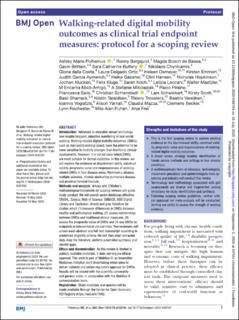Walking-related digital mobility outcomes as clinical trial endpoint measures: protocol for a scoping review
Polhemus, Ashley; Bergquist, Ronny; Bosh de Basea, Magda; Brittain, Gavin; Sara Catherine, Buttery; Nikolaos, Chynkiamis; dalla Costa, Gloria; Laura, Delgado Ortiz; Demeyer, Heleen; Emmert, Kirsten; Garcia Aymerich, Judith; Gassner, Heiko; Hansen, Clint; Hopkinson, Nicholas S.; Klucken, Jochen; Koch, Sarah; Leocani, Letizia; Maetzler, Walter; Micó-Amigo, M Encarna; Mikolaizak, A. Stefanie; Piraino, Paolo; Salis, Francesca; Schlenstedt, Christian; Schwickert, Lars; Scott, Kirsty; Sharrack, Basil; Taraldsen, Kristin; Troosters, Thierry; Vereijken, Beatrix; Vogiatzis, Ioannis; Yarnall, Alison; Mazza, Claudia; Becker, Clemens; Rochester, Lynn; Puhan, Milo Alan; Frei, Anja
Peer reviewed, Journal article
Published version
Permanent lenke
https://hdl.handle.net/11250/2676051Utgivelsesdato
2020Metadata
Vis full innførselSamlinger
Originalversjon
10.1136/bmjopen-2020-038704Sammendrag
Introduction Advances in wearable sensor technology now enable frequent, objective monitoring of real-world walking. Walking-related digital mobility outcomes (DMOs), such as real-world walking speed, have the potential to be more sensitive to mobility changes than traditional clinical assessments. However, it is not yet clear which DMOs are most suitable for formal validation. In this review, we will explore the evidence on discriminant ability, construct validity, prognostic value and responsiveness of walking-related DMOs in four disease areas: Parkinson’s disease, multiple sclerosis, chronic obstructive pulmonary disease and proximal femoral fracture.
Methods and analysis Arksey and O’Malley’s methodological framework for scoping reviews will guide study conduct. We will search seven databases (Medline, CINAHL, Scopus, Web of Science, EMBASE, IEEE Digital Library and Cochrane Library) and grey literature for studies which (1) measure differences in DMOs between healthy and pathological walking, (2) assess relationships between DMOs and traditional clinical measures, (3) assess the prognostic value of DMOs and (4) use DMOs as endpoints in interventional clinical trials. Two reviewers will screen each abstract and full-text manuscript according to predefined eligibility criteria. We will then chart extracted data, map the literature, perform a narrative synthesis and identify gaps.
Ethics and dissemination As this review is limited to publicly available materials, it does not require ethical approval. This work is part of Mobilise-D, an Innovative Medicines Initiative Joint Undertaking which aims to deliver, validate and obtain regulatory approval for DMOs. Results will be shared with the scientific community and general public in cooperation with the Mobilise-D communication team.

